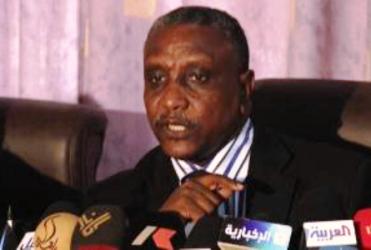SPLM-N to propose roadmap to end humanitarian and political crises in Sudan: Arman
February 12, 2014 (KHARTOUM) – The Sudan People’s Liberation Movement North-(SPLM-N) will present a road map to end the humanitarian crisis and achieve peace in Sudan, said the rebel chief negotiator Yasir Arman hours before the opening of talks on the conflict in the Two Areas brokered by the African Union.

“The SPLM-N will present a comprehensive roadmap to resolve the humanitarian and political situation in Sudan on the basis of 28 June agreement,” Arman told Sudan Tribune after his arrival in Addis Ababa on Wednesday.
He further that these talks are coming at a very unique time where the government speaks about a leap to achieve peace and reconciliation in the country through national dialogue, after an initiative launched by president Omer Al-Bashir on 27 January.
These negotiations are the “biggest test for what the government is saying and claiming. Are they ready to open access for humanitarian assistance (..) are they ready to stop aerial and ground bombardment against civilians,” wondered Arman, alluding to the failure of the two parties to implement a tripartite humanitarian agreement signed on 4 August 2012.
Arman who is also the SPLM-N secretary general further questioned the readiness of the Khartoum to accept 28 June agreement and to open the way for a comprehensive constitutional process as it is provided in that the framework deal.
“The key for any change will start by ending the war in the Blue Nile, Nuba Mountains in South Kordofan and Darfur,” he stressed.
The 28 June agreement provides to establish a political partnership between the ruling National Congress Party and the SPLM-N to organise an inclusive national political process to review the constitution including principles on citizenship, democracy and recognition of diversity.
The process will also include, according to the framework agreement, the relationship between the centre and the states.
On 3 July 2011, president Omer Al-Bashir denounced the deal demanding that talks should be based on the implementation of a protocol relative to the Two Areas included in the Comprehensive Peace Agreement of 2005.
Recently Sudanese government officials say they are committed to the African Union decisions and UN resolution 2046 (2012) which call on the two warring parties to engage in talks aiming to end the conflict in the Two Areas based on 28 June framework agreement.
The SPLM-N released several days ago a list of 24 national experts to join negotiating team in a way to press the government to accept the organisation of a national process to discuss the armed conflicts and establishment of a democratic regime in the country.
Arman said they believe that the resolution of the Sudanese crisis comes through a restructuring of the state “based on a new project expressing the minimum national consensus and including forces of margin”.
Presidential assistant Ibrahim Gandour who is also the head of Sudanese government negotiating team recently said they are ready to engage in peace talks with the SPLM-N but only on Blue Nile and South Kordofan conflict.
(ST)
